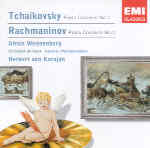Of all Tchaikovsky B-flat minor Piano Concerto recordings by major artists on major labels, the 1970 Weissenberg/Karajan EMI traversal ranks among the worst. The fault lies mostly with Karajan. Seven years earlier for DG he surrounded Sviatoslav Richter’s fabulous piano playing with a heavy, foot-dragging, and lifeless accompaniment. He does the same for Weissenberg, abetted by skewed balances that exaggerate the Orchestre de Paris’ watery brass, banish the winds to the bleachers, and shove the strings under your nose. The pianist attempts to fight the situation by pushing slightly ahead of the beat when he states the opening theme, and by shaping his unaccompanied solos in direct, straightforward arcs. But it’s an uphill battle, and by the time the finale begins at a tempo that resembles something slower and less energized than what Tchaikovsky’s Allegro con fuoco promises, Weissenberg basically phones it in. Yes, his well-lubricated octave technique is pretty awesome, but so is Argerich’s.
The pianist and conductor collaborate to far more rewarding ends in the Rachmaninov Second Concerto. For starters, the Berlin Philharmonic thoroughly outplays its French colleagues. While Karajan revels in Rachmaninov’s tonal opulence, he doesn’t get lost in it. Realizing that the orchestra largely carries the music’s thematic burden, he pursues a steady, symphonically oriented course of action that contrasts to Weissenberg’s saber-edged articulation in the outer movements. But, at its lumbering pace the central Adagio sostenuto nearly crumbles, notwithstanding elegant work from the orchestra’s first desk soloists and Weissenberg’s ability to sustain long lines despite his flinty sonority. In any event, Weissenberg was an outstanding and strikingly original Rachmaninov interpreter, and this fascinating recording is well worth hearing (perhaps someday EMI will bring out his 1979 Third Concerto with Leonard Bernstein). Just skip the Tchaikovsky.
































